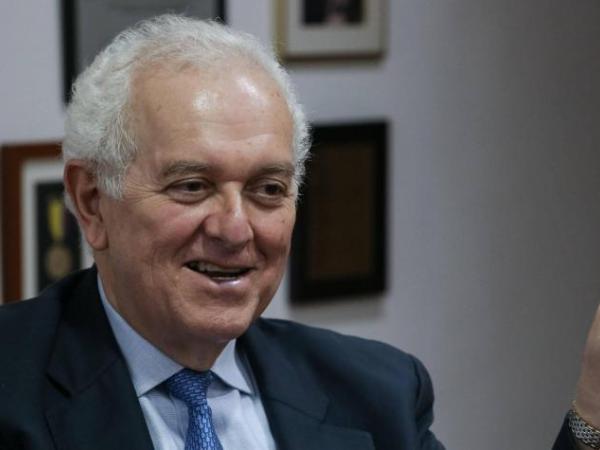The ambitious reform of Colombia’s pension system will create a major new player in the local market and bolster demand for the country’s bonds, according to finance minister José Antonio Ocampo.
(Coverage and costs, the dilemmas generated by the pension reform).
The pension bill that will be sent to Congress this month will give rise to a savings fund that can invest in local debt, Ocampo said, in a broad conversation that also addressed his own future, as well as the decision of the Bank of the Republic of this month.
The bill has been designed to prevent any drop in the national savings rate or demand for peso government bonds known as TES, he said.
“From the point of view of the Ministry of Finance, in all discussions with the Minister of Labor, one of our first principles is that there can be no reduction in the demand for TES,” Ocampo said Sunday, in an interview in Panama City.
“There will be no effect. In fact, there could be a slightly positive effect on the demand for TES.”
(Who can raise the weeks and other questions about pension reform).
The bill, part of President Gustavo Petro’s radical attempt to transform Colombia’s social benefits, would transfer a large majority of workers currently contributing to private pension funds to the state pension system.
Given that these funds hold around a quarter of the TES in circulation, Many investors are concerned about the risks to this market if one of its major players weakens.
For Ocampo, these fears are unfounded, since the new fund will be an additional source of demand.
The Government wants to allocate 20% of the payments of the state system to this fund, and the percentage will increase after 2030.
The fund will be able to invest in corporate bonds, but will not buy shares, Ocampo said.
The government has not yet decided who should manage the fund, but it will do so independently of Colpensiones – the country’s public pension provider – and the finance ministry, he said.
The fund manager will be selected through a competitive process and could potentially be a public institution.
(Finance Minister stays: ‘President Petro asked me to continue’).
The Petro government, which has been in business for seven months, seeks to improve social benefits and reduce inequality with a set of new laws, including the pension bill.
Petro also wants to reform the country’s health system, likewise increasing the role of the state, and boost workers’ rights with a draft labor law.
All three bills are likely to be modified as they pass through Congress. In the last year, Colombia’s local bonds are the worst performers in a Bloomberg index of emerging markets.
One of the reasons for the poor performance is Petro’s promise, during his election campaign last year, to gradually eliminate Colombia’s dependence on oil and coal, which currently account for about half of its exports.
He has vowed not to issue any more exploration licenses and said the transition to clean energy will take about 12 years.
Since taking office, the government has sent mixed messages on the issue as different ministers contradict each other.
(Pension reform: more discounts for workers and the richest).
Last week, the Vice Minister of Mines and Energy, Cristian Andrés Díaz, said that there will be no new contracts “for now”but clarified that this does not mean that “there will never be new contracts.”
Ocampo said that the government hopes to give “a definitive answer” on whether to award new contracts in May, after a report on oil reserves is released.
Central bank meeting
Colombia’s annual inflation accelerated to 13.3% last month, its fastest pace in nearly 25 years. Despite this, and stronger-than-expected economic activity in January, Ocampo said that the central bank has already done enough to ensure that inflation returns to its target.
“The recent economic activity indicator was positive, but the demand indicators are actually quite weak, including imports,” said.
“So the demand effect that monetary policy was intended for of high interest rates, in my opinion, has already been achieved.”.
Several factors that contributed to the increase in inflation are now moving “in the right direction”he explained.
These include international food prices – which are now on the decline – the weather – which is now favorable for domestic food production – and the rebound of the peso from its lows in October, he said.
(Minister of Finance says that inflation has peaked).
Inflation is about to start slowing toward its target and has already slowed for low-income households, Ocampo said.
Colombia’s central bank holds its monetary policy meeting on March 30, and traders They are divided on whether to extend or stop their steepest series of monetary tightening in history with the benchmark rate at 12.75%.
Ocampo sits on the board, along with six other monetary policy officials.
“Risk premium on Ocampo”
Ocampo is perceived as the main voice of economic orthodoxy in the Petro Administration, and as someone who controls some of the most radical ideas in the government.
This means that investors in Colombian assets should require a “risk premium on the departure of Ocampo” in case he leaves government, Dirk Willer, a strategist at Citigroup Inc., said this month. Ocampo said Columbia University, where he works alongside Nobel laureate Joseph Stiglitz, recently extended his leave until June 2024.
The university typically grants a two-year license for public service. He made an exception for Ocampo when he was co-head of the central bank from 2017 to 2020, although this is not common, he added.
Ocampo said the government will keep spending under control anyway, since there is a “national consensus” that the fiscal rule must be respected.
“The issue of spending limits, which of course is one of the crucial issues, is something the president agrees on,” said. “I have never heard the president say that he would not welcome the fiscal rule.”
Bloomberg
















